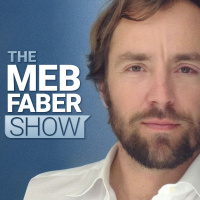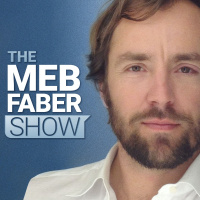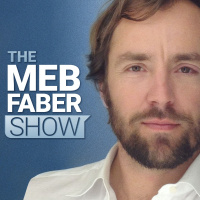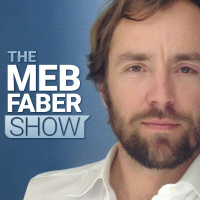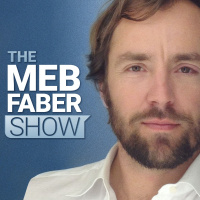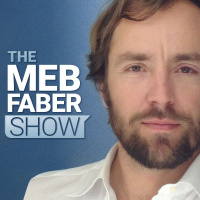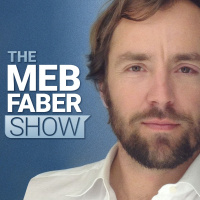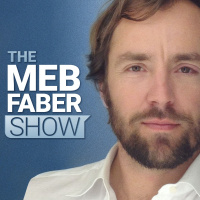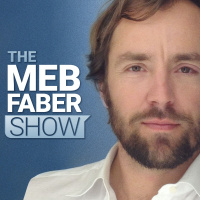Sinopsis
Ready to grow your wealth through smarter investing decisions? With The Meb Faber Show, bestselling author, entrepreneur, and investment fund manager, Meb Faber, brings you insights on todays markets and the art of investing.Featuring some of the top investment professionals in the world as his guests, Meb will help you interpret global equity, bond, and commodity markets just like the pros. Whether its smart beta, trend following, value investing, or any other timely market topic, each week youll hear real market wisdom from the smartest minds in investing today. Better investing starts here.For more information on Meb, please visit MebFaber.com. For more on Cambria Investment Management, visit CambriaInvestments.com. And to learn about Cambrias suite of ETFs and other investment offerings, please visit CambriaFunds.com.
Episodios
-
Bill Smead - The United States Economy is Highly Likely To Be The Strongest The Next 10 Years It's Been Since The Baby Boomers Went Through The 30-45 Year-Old Age Range | #150
10/04/2019 Duración: 01h03minIn episode 150 we welcome Bill Smead. Bill begins with how he came to be a value investor, describing himself as someone who came from a family of educated gamblers, and as a boy, going to greyhound races, learning to put probabilities in his favor, and even developing a criteria system for selecting greyhounds. Next, Bill talks about his beginnings in the investment business, starting out in an era of high interest rates, and reading about Buffett, Lynch, and some of investing’s great minds. He describes his 8 criteria for selecting investments: 1) Does it meet an economic need 2) Does it have a long history of profitability 3) Does it have a wide moat 4) Does it generate high and consistent cash flow 5) Can the company be purchased at a discount 6) Business must be shareholder friendly 7) The company must have a strong balance sheet 8) The company must have strong insider ownership. Meb then asks Bill to elaborate on the investment landscape, and what he’s seeing in a specific pocket of the market. Bill dis
-
Phil Haslett - Lyft’s Doing $2 Billion Dollars A Year In Revenue, And It’s Growing That Revenue 105% A Year. There Are Only 8 Companies Listed On The Stock Exchange In The U.S. With That Kind Of Profile | #149
03/04/2019 Duración: 01h01minIn episode 149 we welcome back our guest from Episode 122, Phil Haslett. Meb and Phil begin the episode with a chat of the IPO environment so far in 2019, and the recent Lyft IPO. Phil then gets into the cyclicality of IPOs in general, and that IPOs tend to be most successful when the market is not so volatile. Meb asks Phil about the IPO process. Phil starts with banking and how the banking relationship works, and what some companies have done to avoid the high costs of going through the IPO process. Google was the first to give an alternative approach to the IPO process a shot, and Spotify found huge success through a direct listing. Next, Phil gets into the changing characteristics of what firms look like in today’s IPO cycle, vs. the past. He discusses that the value of which companies go public is far higher than it used to be, and they are going public much later. This stems from companies raising large amounts of capital as private companies. Eventually, though, they’ll need to go public for a couple o
-
Paul Lountzis - The Qualitative Characteristics Are Becoming Significantly More Meaningful And More Important In Company Analysis | #148
27/03/2019 Duración: 01h16minIn episode 148 we welcome Paul Lountzis. Paul starts with his background in consulting that led him to develop a skillset in competitive analysis that meant going out into the field to conduct research far beyond the numbers, leading to “differential insights.” He wanted to get into value investing and reached out to a number of firms including Warren Buffett’s assistant, Gladys Kaiser. He ended up interviewing with Chuck Royce’s partner, Tom Ebright, and after Chuck saw his work, he was put on research projects for Chuck. He then went to work for Ruane, Cunniff & Goldfarm before founding Lountzis Asset Management. Paul then discusses his framework of finding outstanding businesses that are unique, different, and special. He talks about that changes that are taking place and how the qualitative characteristics are becoming significantly more meaningful in company analysis. He highlights the importance of field research primarily to prevent permanent loss of capital, and to drive greater conviction to potentia
-
The Stay Rich Portfolio (or, How to Add 2% Yield to Your Savings Account) | #147
20/03/2019 Duración: 17minEpisode 147 is a Meb Short. In this episode, you’ll hear Meb discuss a critical topic to consider for investors…The portfolio that helps you get rich isn’t necessarily the portfolio that’s going to help you remain rich. In this piece, Meb explains that risk-free assets often considered “safe,” aren’t exactly that, if viewed in the proper context. He proposes that with some thought, a strategy can be engineered to offer expected drawdowns similar to T-Bills historically, while at the same time, going above and beyond by historically offering exposure to some positive performance after inflation. All this and more in episode 147. Learn more about your ad choices. Visit megaphone.fm/adchoices
-
Neil Littman - The More Risk You Kill, Inherently, The More Value You Create | #146
13/03/2019 Duración: 01h01minIn episode 146 we welcome Neil Littman. Neil starts with his background and how he came up with the idea of Bioverge, a platform that offers an opportunity to invest in healthcare startups, with the mission of democratizing access to early stage healthcare companies. Neil follows that with a discussion of his time at CIRM, and some of the incredible stories and the science he experienced firsthand during his involvement. It was his time at CIRM where he learned that the institutional model of financing and investing could be applied to the retail sector as well. That paired with his desire to provide exposure to the alternative asset class created the perfect storm and the result was Bioverge. Meb then asks Neil to get into the structure of the Bioverge platform. Neil explains that the decentralized network they built provides warm referrals to Bioverge and ultimately links capital to potential investment opportunities. In addition to that, Bioverge provides value added service beyond capital that is importan
-
Cloning The Largest Hedge Fund In The World: Bridgewater's All Weather | #145
06/03/2019 Duración: 14minEpisode 145 is a Meb Short. In this episode, you’ll hear Meb follow-up on his 2014 article, Cloning the Largest Hedge Fund in the World: Bridgewater’s All Weather. Meb covers how Bridgewater’s All Weather portfolio compared to the global asset allocation portfolio, and an extension, the global asset allocation portfolio with leverage. He winds down by giving an update on how the strategies have performed since writing the piece in 2014. All this and more in episode 145. Learn more about your ad choices. Visit megaphone.fm/adchoices
-
Marty Bergin - Adapt Or Die | #144
27/02/2019 Duración: 58minIn Episode 144 we welcome Marty Bergin. Marty begins by going through his background, the history of Dunn Capital and the relationship he had with Bill Dunn, the founder of Dunn Capital. That relationship opened the door for Marty to ultimately work or Bill, and to later become the owner of the firm as part of a transition plan. Next, Meb asks Marty to describe trend following as it relates to Dunn. Marty describes that trend following is pretty basic, but there’s magic in how you develop a portfolio with the strategy. At Dunn, Marty and his team rely on an adaptive trend-following system. From a portfolio management perspective, they look for markets with enough volume to trade in 55 markets across commodities, currencies, interest rates, bonds, equities, and volatility with an equal allocation of risk buckets for each market they trade. Meb follows that with a question about how it all fits together on a high level. Marty explains the program is not restricted in any way, and multiple methods are used for d
-
David Eifrig - Most People Run Losses Into The Ground | #143
20/02/2019 Duración: 01h10minIn episode 143 we welcome Dr. David Eifrig. David begins by going through his background and pathway to finance. He first discovered his interest in investing through the occasional Barron’s issue, and understood he didn’t want to follow in his father’s footsteps in medicine, moving on to Kellogg for business school before moving on to Wall Street. He describes that while working in finance, he decided to pursue science and medical school and ultimately helped build a business that was sold to Roche. While in residency, he began writing and that launched him into newsletter writing. Meb then asks David to describe his publications, Retirement Millionaire, Retirement Trader, Income Intelligence, and the newly launched Advanced Options. Meb asks David about how he thinks about value and price declines. David responds with some background on how he prefers to teach investing, and provides a simple framework for thinking about price and value. After a quick discussion of the closed-end fund space, the conversatio
-
Ryan Ansin - I Don't Believe That It's Easy To Back Into Revenue In This Industry, There Are Just A Thousand Things That Can Go Wrong | #142
13/02/2019 Duración: 57minIn episode 142 we welcome Ryan Ansin. Ryan begins by discussing how his introduction into the cannabis industry started with thoughtful conversations at home, focused on the social justice perspective. He started investing in the industry over 4 years ago, then had an opportunity to purchase a factory in Fitchburg, Massachusetts. What started off as a passive real estate investment he thought would be a fit for vertical farming, and a suggestion from vertical farming experts to consider cultivating cannabis, led him to start his operation, Revolutionary. Meb asks Ryan to speak in more depth about the business and the cannabis ecosystem. Ryan discusses the laws that shaped the cannabis industry in Massachusetts that caused a lot of fallout until recently. His operation is vertically integrated, and they go after products they can excel in, while licensing and distributing other products they don’t feel they can execute as well. Next, he discusses his vision for the company, and his goal to expand within Massac
-
Radio Show - 34 of 40 Countries Have Negative 52 Week Momentum...Big Tax Bills for Mutual Fund Investors...and Listener Q&A | #141
06/02/2019 Duración: 56minEpisode 141 has a radio show format. We cover tweets of the month from Meb as well as listener Q&A. For Tweets of the Month, a few topics we cover include: A tweet from Charlie Bilello covering the range of equity returns over the past 11 years, from the U.S. +135% to Russia -48%. Norbert Kiemling’s tweet about his team’s updated data that shows 34 of 40 countries with negative 52 week momentum. Jason Zweig’s article on tax bills for mutual fund investors. We then get into listener Q&A, a few questions we touch on include: How can I find a good mentor in this field? How can I build a network without Ivy League or Silicon Valley connections? What knowledge, skills, degrees, certifications are most important and how do you recommend I obtain those skills? There’s this and plenty more in episode 141. Learn more about your ad choices. Visit megaphone.fm/adchoices
-
Ralph Acampora - Don't Ever Fight Papa Dow | #140
30/01/2019 Duración: 57minIn episode 140 we welcome Ralph Acampora. Ralph begins with his background and talks about the accident that left him in a body cast for months. His father’s best friend left a copy of something market related that he was reading when he visited the hospital. That piqued his curiosity, and he later found a job as a junior analyst on Wall Street. It was that job that introduced him to technical analysis. Meb then gets into technical analysis and what is, and what it means to Ralph. Ralph discusses how he keeps it simple, looking at trends every day with a few indicators. He then goes on to explain Dow Theory before explaining that when he took a look at the market through the lens of Dow Theory, when the Dow Industrials, and Dow Transports hit low points late last year, he saw a downturn signal. He mentions the post-Christmas rally was a nice move in a short period of time, but he refers to it as a “vacuum” rally. The bad news is that he saw the rally encounter overhead resistance and is looking overbought. Fo
-
Taz Turner and Nate Nienhuis - We're Really Driving At What We Feel Is The Holy Grail Of Cannabis | #139
23/01/2019 Duración: 01h02minIn episode 139, we welcome Taz Turner, CEO, and Nate Nienhuis, COO, of CordovaCann in the 4th installment of our cannabis series. The episode begins with the backstory behind CordovaCann, and the mission to produce superior plants and consistent and predictable products. Meb asks the pair to get into their backgrounds. Nate starts by describing his deep industry background from consulting with operators, to working on the regulatory side in Washington D.C. Taz then talks about his career in finance, and what led him into investing in the cannabis industry first in Canada, then in the U.S. He goes on to discuss his conversations with Nate and others in the industry leading to the launch of Cordova. Meb then asks about the Cordova roadmap with the company ultimately growing into a cannabis operation. Taz had the idea of targeting the more established markets in the western United States and overlaying their technology platform to add value to the operators. Nate then gets into the details of the importance of c
-
Yariv Haim - You Should Never Try To Reassess Your Risk Appetite When Markets Crash | #138
16/01/2019 Duración: 01h01minIn episode 138, we welcome Yariv Haim. Yariv begins with his backstory. He had been working for a family running marketing and business development. He was asked to get involved with the investment management needs of the family, and through a path of his own, had gained enough knowledge to crystallize an approach he now follows at Sparrows Capital. Yariv discusses how he focused on evidence from impartial academic institutions and research, and refers to the strategies derived from them as evidence-based investing strategies. After doing his research, he saw an informational gap in the industry, and it still exists today. Yariv then gets into 6 core principles 1) return is primarily a function of risk, 2) certain risks attract persistent premium, 3) Diversification works, 4) stock picking and market timing seldom add value, 5) remain invested across the full cycle, 6) costs matter (although it isn’t the only prism to evaluate investment opportunities). Next, Meb asks about factors and smart beta. Yariv di
-
Emily and Morgan Paxhia - The Growers Who Focused On Creating Efficient Operations Are The Ones That Are Still Around Today | #137
09/01/2019 Duración: 51minIn episode 137 we welcome the sibling duo, Emily and Morgan Paxhia. Emily and Morgan begin by discussing their backstory, and how coming from a family with an entrepreneurial background influenced their path to start Poseidon Asset Management to specialize in cannabis investing. Emily and Morgan each describe their previous roles and the skills they acquired in their respective industries (Consulting for Emily, and Investment Management for Morgan) that helped them build foundations that transitioned well into asset management. Next, the pair discusses starting their fund, and the journey that included seeking service providers, raising capital, and the many challenges and hurdles they faced along the way. Morgan mentioned that even with all the hurdles, they knew they were on to something and continued to drive forward. Meb then asks about cannabis industry trends and what the space has in store looking forward. Emily covers some regulatory and political issues and then talks about the challenge they will fa
-
Steve Romick - Value Investing Is, To Us, Simply Investing With A Margin Of Safety, Believing That You've Made An Investment Where It's Hard To Lose Money Over Time | #136
02/01/2019 Duración: 01h03minIn episode 136, we welcome Steve Romick. The conversation begins with Steve explaining that he hated losing more than he enjoyed winning, and while there wasn’t one event that led him to value investing, he considers his aversion to loss a contributor to being drawn to the value-oriented investment approach. Meb then transitions the conversation by asking Steve to characterize the investment strategy of FPA’s Crescent Fund. Steve talks about the value investing framework as investing with a margin of safety and how it has morphed over the years from being about the balance sheet to now, through technological innovation, the corporate lifecycle has been as short of it has ever been with the most of the density of innovation happening in the past 50 years. Next, the discussion turns to investment framework. Steve describes this team of 11, and how the job of his team is to understand the business and industry first on both a quantitative and qualitative basis. He describes the go-anywhere mandate as a potential
-
Karan Wadhera - We're Still In Very, Very Early Innings For What's Going To Be An Incredible Ride | #135
26/12/2018 Duración: 42minIn Episode 135, we welcome Karan Wadhera. We start with Karan giving his backstory that includes a stint at Goldman Sachs and some entrepreneurship. After some time studying the industry, he ultimately got involved in the Cannabis space with Casa Verde. Meb then asks about what Karan sees as a “why now” investment opportunity. Karan talks about the opportunity coming out of the existing black market that is transitioning into a legal market and a range of products that have more to do with other things than just getting high. Next, the conversation shifts to the political landscape, and Karan provides some detail on the gap between the state and federal level, and the federal view of cannabis as a Schedule 1 controlled substance. He discusses how dramatically things are changing, especially in the political space. Meb then asks about the investment landscape for cannabis. Karan talks about how volatile the public market space is, and how when evaluating the theme, Casa Verde saw an opportunity in the ancilla
-
Chris Cole - Volatility Is The Instrument That Makes Us Face Truth | #134
19/12/2018 Duración: 01h03minIn Episode 134, we welcome Chris Cole. Meb kicks off the show by asking Chris to describe his nontraditional background. Chris studied cinematography in film school at USC, while trading options in his spare time. He eventually made a career switch and began in Merrill Lynch’s analyst program in New York, while trading in his spare time. With his trading, he eventually created $1 Million to start his firm. Next, the conversation transitions to Chris’s work, including his take that “Volatility is the only asset class.” Chris follows by discussing how returns can be deconstructed to represent either “short-vol” or “long-vol” strategies. He mentions that the average institutional portfolio is a 98% short-volatility portfolio that will not perform all that well during a period of regime change. Meb then brings up some recent events that have transpired to lead into a chat about short vs. long volatility, and some dangers when thinking about the strategies. Chris discusses how volatility can be expressed in both t
-
Todd Harrison - Humanity Has Had a 30,000 Year Relationship with Cannabis | #133
12/12/2018 Duración: 50minIn Episode 133, we welcome Todd Harrison. Meb begins the conversation asking Todd about what got him into the cannabis space. Todd discusses his intellectual curiosity of the space, and what he has learned about the history of cannabis, from the 30,000 year relationship we have had with it as humans, to the US weaponizing marijuana. Meb then leads into the topic of governments and states changing their attitudes. Todd talks about it being a confluence of things, but gets into a personal story of how he discovered the efficacious ability of cannabis by working with Dr. Julie Holland after struggling with a decade long treatment of PTSD with a Western medicine protocol. The conversation then turns to the marketplace. Todd relays that there is quite a bit ahead for the consumer space. In hearing what scientists have to say, it has painted a much different picture for the breadth of wellness that is going to be disrupted going forward. Next, Meb and Todd discuss a little background on cannabinoids in general. Tod
-
Radio Show - Since 1989 80% of Stocks Had a Collective Return of 0%... A Goldman Bear-Market Indicator at Its Highest Point in Decades... and Listener Q&A | #132
05/12/2018 Duración: 01h08minEpisode 132 has a radio show format. In this one, we cover numerous Tweets of the Week from Meb as well as listener Q&A. For our Tweets of the Week, a few we cover include: A chart from Longboard about returns. Since 1989, the worst performing 11,513 stocks – which is 80% of all stocks, collectively had a total return of 0%. The best performing 2,942 stocks (20% of all) accounted for all the gains. A tweet about another option selling fund blow-up. A Jason Zweig post about how many investors should question the dogma of “stocks for the long” run since history shows that a portfolio of bonds has outperformed stocks surprisingly often and for long periods. The statistic “According to Goldman, its indicator at 73% marks the highest bear-market reading since the late 1960s and early 1970s, which (with a few exceptions) is consistent with returns of zero over the following 12 months.” We then jump into listener Q&A. Some you’ll hear include: In your book, Global Asset Allocation, you compare the results of w
-
David Rosenberg - If Next Year is Not a Recession, It’s Going to Feel Like It | #131
28/11/2018 Duración: 43minIn Episode 131, we welcome economist David Rosenberg. We jump right into David’s view of the current economic landscape. David talks about the global economy, especially the US looking classically late cycle, as the economy is running low on skilled workers, and states “If next year is not a recession, it’s going to feel like it.” Meb asks about the indicators he relies on. David discusses that there are 15 equally weighted indicators he’s looking at, 14 are screaming late cycle, and two stand out the most. ??? Two of the most important indicators for the US are the lack of skilled workers, with a lot of growth coming from people with no better than a high school education, and an immigration policy that has decreased the pool of labor. This leads into a discussion about inflationary pressures. While the strong dollar has been deflationary, more and more companies are passing on costs to customers. Services, which dominates the consumer spending pie, is sensitive to labor costs, and the inflation we will see











